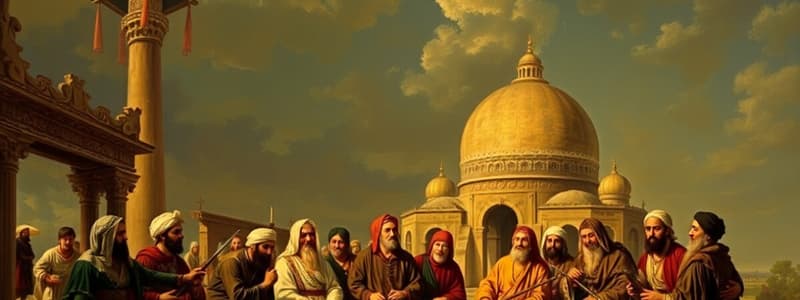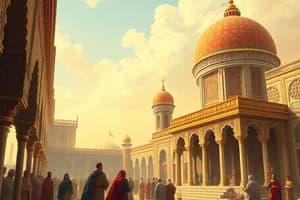Podcast
Questions and Answers
What was a significant factor in the spread of Christianity after the death of Jesus?
What was a significant factor in the spread of Christianity after the death of Jesus?
- The establishment of the Islamic Caliphate
- The publication of the Quran
- The persecution of Christians by Roman authorities (correct)
- The immediate conversion of the Roman Empire to Christianity
Which event marks the beginning of Islam's expansion under Muhammad's leadership?
Which event marks the beginning of Islam's expansion under Muhammad's leadership?
- His return to Mecca in 629 CE (correct)
- His flight to Medina
- The revelation of the Quran
- His death in 632 CE
What is one right that Arab women had during the time of early Islam?
What is one right that Arab women had during the time of early Islam?
- They could not divorce their husbands
- They had the right to inherit property (correct)
- They were prohibited from engaging in business
- They could hold multiple husbands
What was the status of women in early Islamic society according to the Quran?
What was the status of women in early Islamic society according to the Quran?
What was the primary geographical extent of Dar al-Islam?
What was the primary geographical extent of Dar al-Islam?
What was a common practice regarding women's social lives in early Islam?
What was a common practice regarding women's social lives in early Islam?
Which of the following best describes the concept of the Jewish diaspora?
Which of the following best describes the concept of the Jewish diaspora?
Which feature was incorporated into Islamic practice from earlier traditions regarding women?
Which feature was incorporated into Islamic practice from earlier traditions regarding women?
How did Muhammad’s experience in Medina differ from that in Mecca?
How did Muhammad’s experience in Medina differ from that in Mecca?
What was the role of the Quran in relation to the status of women?
What was the role of the Quran in relation to the status of women?
What was the main belief of the Sunni regarding leadership after Muhammad's death?
What was the main belief of the Sunni regarding leadership after Muhammad's death?
What significant event occurred after Ali's assassination?
What significant event occurred after Ali's assassination?
Which city served as the capital of the Abbasid Caliphate?
Which city served as the capital of the Abbasid Caliphate?
What role did the House of Wisdom play in Islamic society?
What role did the House of Wisdom play in Islamic society?
What were the contributions of Al-Khwarizimi to mathematics?
What were the contributions of Al-Khwarizimi to mathematics?
How did the Umayyad Caliphate treat non-Muslims in their territories?
How did the Umayyad Caliphate treat non-Muslims in their territories?
Which innovation is associated with Al-Tusi?
Which innovation is associated with Al-Tusi?
What characterized the society of Al-Andalus during its peak?
What characterized the society of Al-Andalus during its peak?
What was a key result of the Christian Reconquista in 1492?
What was a key result of the Christian Reconquista in 1492?
What impact did Turkic invasions have on India?
What impact did Turkic invasions have on India?
Flashcards
Abrahamic Religions
Abrahamic Religions
Three monotheistic religions that trace their lineage to Abraham: Judaism, Christianity, and Islam.
Judaism
Judaism
An ancient monotheistic religion originating in the Middle East, focused on the Hebrew Bible and the belief in one God.
Jewish Diaspora
Jewish Diaspora
The forced dispersion of Jews from their homeland, primarily due to invasions and persecution.
Christianity
Christianity
Signup and view all the flashcards
Islam
Islam
Signup and view all the flashcards
Quran
Quran
Signup and view all the flashcards
Status of Women in Arabia
Status of Women in Arabia
Signup and view all the flashcards
Impact of Islam on Women
Impact of Islam on Women
Signup and view all the flashcards
Dar al-Islam
Dar al-Islam
Signup and view all the flashcards
Veiling of Women in Islam
Veiling of Women in Islam
Signup and view all the flashcards
Succession Crisis
Succession Crisis
Signup and view all the flashcards
Abu Bakr
Abu Bakr
Signup and view all the flashcards
Ali
Ali
Signup and view all the flashcards
Umayyad Caliphate
Umayyad Caliphate
Signup and view all the flashcards
Golden Age of Islam
Golden Age of Islam
Signup and view all the flashcards
Abbasid Caliphate
Abbasid Caliphate
Signup and view all the flashcards
House of Wisdom
House of Wisdom
Signup and view all the flashcards
Al-Andalus
Al-Andalus
Signup and view all the flashcards
Turkic Muslims
Turkic Muslims
Signup and view all the flashcards
Delhi Sultanate
Delhi Sultanate
Signup and view all the flashcards
Study Notes
Developments in Dar al-Islam
- Islamic Caliphate: A vast empire stretching from Spain to India, connecting via land and sea trade routes.
- Diverse Civilization: Included Arabs, Persians, Turks, and others; multiple religions, including Islam, Judaism, and Christianity, coexisted.
- Succession Crisis: Muhammad's death led to disputes over leadership, splitting the Muslim community into Sunni and Shia factions, resulting in civil war.
Islamic Empires
- Umayyad Caliphate: Overthrew the rival faction after the civil war, continued conquests, and established Damascus as the capital creating a centralized government with Arab officials, favoring Arabs in positions of wealth and authority. Non-Muslims faced taxation under Umayyad rule but faced less discrimination than under some later regimes.
- Abbasid Caliphate (Golden Age): Established Baghdad as the capital, creating a centralized government and a bureaucracy of educated elites. The House of Wisdom, a public academy, fostered learning and translated knowledge from various languages into Arabic/Persian. This preserved European knowledge during the "Dark Ages."
Islamic Innovations and Advances
- House of Wisdom: A key center of learning, translating and preserving knowledge from various cultures.
- Scientific Achievements: Al-Tusi (astronomy, trigonometry, biology, chemistry); Ibn Sina (medicine, Canon of Medicine); Al-Khwarizimi (algebra); Al-Idrisi (geography and cartography).
- Cultural and Architectural Achievements: Domed architecture, courtyards, floral and geometric art, calligraphy.
Islamic Expansion and Interactions
- Al-Andalus (Islamic Spain): A prosperous region characterized by cross-cultural exchange with Christian Europe and religious tolerance, before the Christian Reconquista.
- Turkic Muslims: Seljuk Empire, conquered Anatolia and parts of the Byzantine Empire; Mamluk Sultanate, rose from former slaves to conquer Egypt.
- Delhi Sultanate: Turkic invasions into Northern India, spreading Islam. A significant portion of the population converted to Islam. This often involved converting from lower castes and disillusioned Buddhists, but caused tension between Muslims and Hindus in the region.
Status of Women in Dar al-Islam
- Pre-Islamic Arabia: Women had rights such as inheriting property, divorcing, and engaging in business but lived within a patriarchal society.
- Impact of Islam: Islam declared spiritual equality between men and women but maintained social inequalities (Women's testimonies in court, etc.)
- Restrictions on Women: Islamic law granted men the right to have multiple wives, while women could only have one. Islam recognized descent through the male line, and women's lives and social/sexual choices were heavily governed by male guardians.
Studying That Suits You
Use AI to generate personalized quizzes and flashcards to suit your learning preferences.




